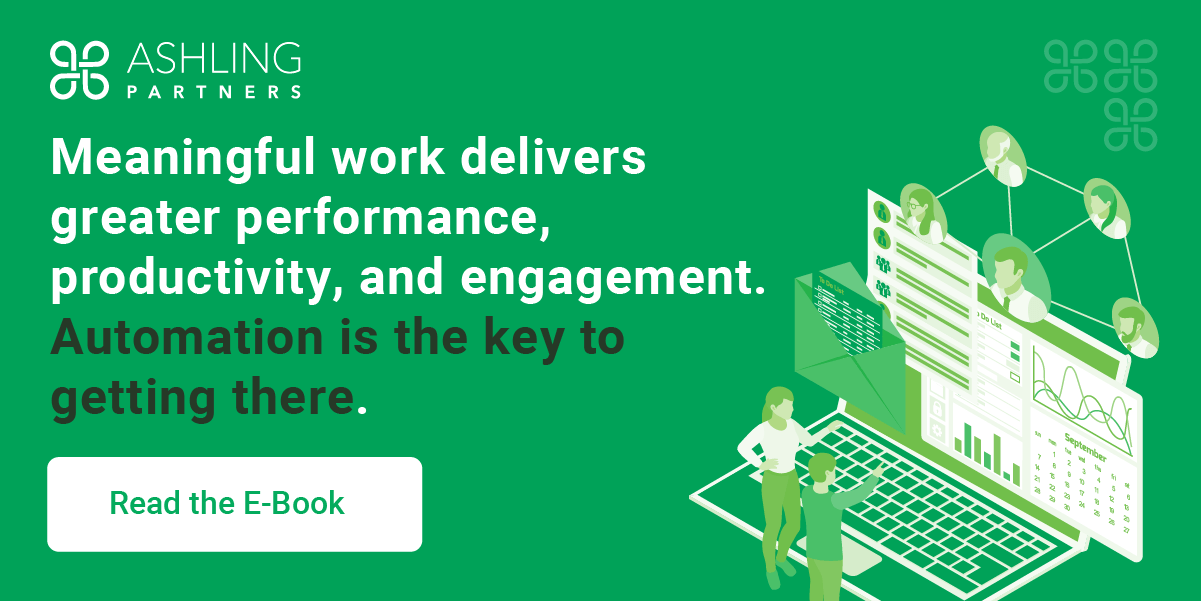The philosophy of meaningful work has become a core focus for many forward-thinking companies. HR professionals and employee advocates believe in its fundamentals: that workers should find their jobs inspiring, challenging, and fulfilling beyond the monetary benefits.
There are obvious advantages for businesses to prioritize meaningful work. Employees who are happy, engaged, and valued will likely be more satisfied and stay loyal to their company. As a result, an organization’s ability to retain skilled workers who work with a purpose is good for business. It can reduce costs associated with turnover and lead to more innovation from employees, which could also have revenue implications.
It’s easy to see how meaningful work connects to employee retention. When you add automation to the equation, retention gets even better. Automation creates more meaningful work in several ways, from removing tedious, repetitive tasks from workflows to delivering real-time insights for more accurate decision-making.
Let’s explore how these three concepts work together to drive success for your employees and business.
What Does ‘Meaningful Work’ Mean?
Meaningful work doesn’t have a standard definition because it means different things to different people. However, we can look at it from two dimensions.
First is employee fulfillment. From this angle, the big question is, do your people work with purpose? One of the biggest hurdles to this is when workers have too many mundane, and low-value tasks to perform, which can become burdensome and keep employees from being strategic and creative.
Most people want work that interests and challenges them. Workers expect autonomy, administrative flexibility, and the tools to get things done easier. When they have these things, they feel empowered and are less likely to feel indifferent, which inevitably leads to turnover.
The second dimension ties into automation and its benefits. The pursuit of meaningful work for employees means keeping humans from acting like robots. In the 21st century, people have little patience for thoughtless work and expect technology to make their lives easier. That’s especially true for digital natives—those who grew up with technology as part of their daily lives to some extent—who now make up a large percentage of the workforce.
The removal of these antiquated processes is possible with animation, which introduces digital robots into workflows and processes to remove these tasks from humans’ to-do lists.
What Makes Work Meaningful?
Each person will have a different idea of what makes work meaningful to them. However, there are some attributes that most people agree are part of meaningful work. These include:
- Work that inspires them
- Jobs that offer opportunities to learn, grow, and advance
- Feelings of being valued and appreciated
- Respectful work environments where ideas are welcomed and encouraged
- Common and shared goals
- Understanding how what they do contributes to the company’s success
Creating a workplace where your staff has these feelings and beliefs is critical. It’s a competitive advantage and a key way to keep your top talent, and it may lead to more than money. It may be hard to believe that meaningful work trumps compensation, but 90 percent of people are willing to earn less in exchange for doing meaningful work.
If you want to improve retention, you have to look at where the gaps exist in creating more meaningful work. Cultural shifts may be necessary, but one of the easiest things to do is to invest in automation.
The Importance of Meaningful Work in Employee Retention
It’s no secret that retention is a dynamic and fluid metric. Big shifts in the past few years have added to this complex objective. Many of the fundamentals remain. Increased job satisfaction means harder-working, more engaged employees who stick around!
When a position fails to satisfy them, an employee will leave. They’ve done so en masse in the past few years, driven primarily by the pandemic and resulting in what is now known as the Great Resignation. The job market remains competitive, and unemployment remains low. Workers want more than just to punch a timecard.
Many factors can impact whether or not an employee stays, but you have the most control over streamlining and improving processes. When you prioritize this, you enable your employees to work smarter and find more enjoyment in the day-to-day.
Greater Employee Retention Yields Many Benefits
You’re keenly aware that higher employee retention is good news. There’s hard data to back up the benefits—and they aren’t just about reducing costs.
The Cost Benefits
We’ll start with the most obvious. According to a 2017 retention report, an average employee exit costs you 33 percent of their annual salary. That’s a considerable number, even for entry-level roles. If you reduce the cost of turnover, you can reallocate that budget to other initiatives.
The Culture Benefits
Employees engaging in meaningful work actually make your culture stronger. People who are satisfied in their jobs contribute to an atmosphere of appreciation, transparency, respect, and openness to feedback.
The Advancement Pipeline Benefits
Employees who feel they are progressing in their careers are 20 percent more likely to still be in their job a year later. Those who don’t feel they are progressing will look for employers who can give them this opportunity. If you can retain your employees who start in entry-level positions, they can be your leaders of tomorrow. Meaningful work is a crucial component of building your talent pipeline.
The Morale Benefits
Engaged employees who stay with you over the long term often have a genuine enthusiasm for the job and company. Morale can only be high when people are truly satisfied with their roles and their leaders.
The above benefits are good for your employees and your company. How will you achieve them? Let’s look at how to get there with automation.
How Does Automation Improve Meaningfulness of Work?
You can’t wave a wand and expect automation to transform everything into meaningful work. It can, however, be a key driver in reaching the goal of more meaningful work. Automation removes repetition from workflows, so your people can be strategists, not mindless task drones.
The first step is designing automation with digital robots that can complete rules-based tasks like humans. This is Robotic Process Automation (RPA), and you can apply it to many processes to relieve workers from repetition.
As you begin an automation journey, you’ll also be able to definitively understand a process through Process Mining. With this technique, you visualize a process flow from your systems so you can then streamline and accelerate it with automation.
Beyond RPA, you can elevate automation by adding Artificial Intelligence and Machine Learning. The combination of these elements is called Intelligent Process Automation (IPA). With IPA, you can improve end-to-end processes, optimize decision-making, address bottlenecks, and enhance your employees’ experiences.
To illustrate how automation leads to more meaningful work, here are some examples:
- Contact center agents get support with ticket tagging, automatically moving data into new fields, offering self-service options, and surfacing knowledge base articles.
- Nurses can focus on patient care rather than admin work.
- Marketers can spend more time analyzing data if they don’t first have to manually aggregate it from different systems.
- Field workers can better understand asset performance and monitor assets for maintenance needs and outages so that they can be more proactive than reactive.
Learn More About the Connection Between Automation and Meaningful Work
Employee retention is only one benefit of meaningful work. There are many additional benefits to explore and consider. Learn more by downloading How Automation Plays a Key Role in Meaningful Work.



